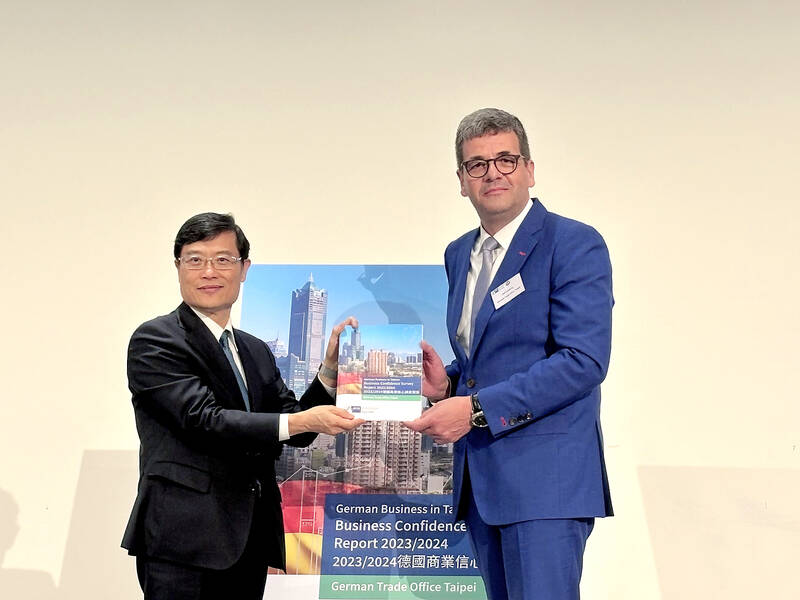German companies in Taiwan are optimistic about the nation’s economy this year and beyond, and intend to invest, although a sizeable number took a hit to their profit margins last year, the German Trade Office Taipei said yesterday, citing an annual business confidence survey.
Nearly 60 percent of German companies in Taiwan are positive about the nation’s economic prospects in next three years and 48.5 percent plan to invest in the next two years, the survey found.
The easing of the supply chain crisis underpinned the sentiment pickup, although last year proved challenging, German Trade Office Taipei chief representative and executive director Axel Limberg told a media briefing in Taipei.

Photo: CNA
Limberg said that German investment in Taiwan grew to US$1.55 billion last year, making it Taiwan’s second-largest foreign investor.
That helped explain why German companies here have seen their scale expanding.
The proportion of companies with revenue of more than NT$1 billion increased from 16.1 percent in 2022 to 21.6 percent last year, the office said.
Companies with revenues of between NT$250 million and NT$1 billion climbed to 28.9 percent, it said.
However, revenue expansion failed to go hand-in-hand with earnings before taxes, the office said.
More than 50 percent of companies reported an increase in pretax margins in both 2021 and 2022, but only 29.5 percent managed to boost their earnings last year, it said.
German companies in Taiwan ranked global economic growth and Taiwan’s economic growth as their top concerns, followed by cross-strait relations, the survey showed.
Cross-strait tensions are increasingly seen as a burden and more than one-third of supply chains have been negatively impacted, it said, adding that more firms expect their business to take a hit.
Meanwhile, 64.9 percent of German companies in Taiwan reported difficulty recruiting skilled workers, with technicians and engineers the most frequently mentioned vacancies, the office said.
To address the issue, 74.5 percent of the firms support to the establishment of dual vocational training programs that combine theory and practice at non-university educational facilities, it said.
Dual vocational training is considered a cornerstone of the educational system and economic development in Germany, it added.
This year, 35.4 percent of German companies in Taiwan plan to invest in production facilities, a 10.4 percentage point increase from last year, affirming the rising importance of Taiwan for those businesses, the office said.

CHIP WAR: Tariffs on Taiwanese chips would prompt companies to move their factories, but not necessarily to the US, unleashing a ‘global cross-sector tariff war’ US President Donald Trump would “shoot himself in the foot” if he follows through on his recent pledge to impose higher tariffs on Taiwanese and other foreign semiconductors entering the US, analysts said. Trump’s plans to raise tariffs on chips manufactured in Taiwan to as high as 100 percent would backfire, macroeconomist Henry Wu (吳嘉隆) said. He would “shoot himself in the foot,” Wu said on Saturday, as such economic measures would lead Taiwanese chip suppliers to pass on additional costs to their US clients and consumers, and ultimately cause another wave of inflation. Trump has claimed that Taiwan took up to

A start-up in Mexico is trying to help get a handle on one coastal city’s plastic waste problem by converting it into gasoline, diesel and other fuels. With less than 10 percent of the world’s plastics being recycled, Petgas’ idea is that rather than letting discarded plastic become waste, it can become productive again as fuel. Petgas developed a machine in the port city of Boca del Rio that uses pyrolysis, a thermodynamic process that heats plastics in the absence of oxygen, breaking it down to produce gasoline, diesel, kerosene, paraffin and coke. Petgas chief technology officer Carlos Parraguirre Diaz said that in

Japan intends to closely monitor the impact on its currency of US President Donald Trump’s new tariffs and is worried about the international fallout from the trade imposts, Japanese Minister of Finance Katsunobu Kato said. “We need to carefully see how the exchange rate and other factors will be affected and what form US monetary policy will take in the future,” Kato said yesterday in an interview with Fuji Television. Japan is very concerned about how the tariffs might impact the global economy, he added. Kato spoke as nations and firms brace for potential repercussions after Trump unleashed the first salvo of

SUBSIDIES: The nominee for commerce secretary indicated the Trump administration wants to put its stamp on the plan, but not unravel it entirely US President Donald Trump’s pick to lead the agency in charge of a US$52 billion semiconductor subsidy program declined to give it unqualified support, raising questions about the disbursement of funds to companies like Intel Corp and Taiwan Semiconductor Manufacturing Co (台積電). “I can’t say that I can honor something I haven’t read,” Howard Lutnick, Trump’s nominee for commerce secretary, said of the binding CHIPS and Science Act awards in a confirmation hearing on Wednesday. “To the extent monies have been disbursed, I would commit to rigorously enforcing documents that have been signed by those companies to make sure we get